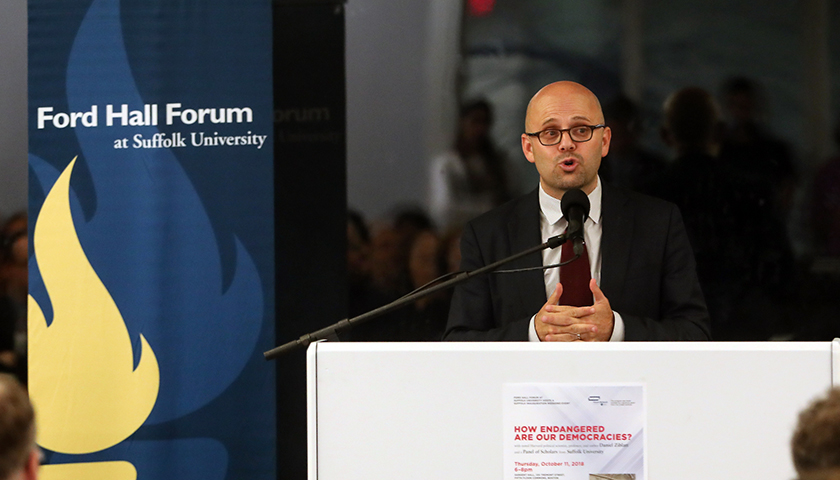Are Our Democracies Endangered?

There was a time when military action was the most likely cause of turning a nation from democracy to demagoguery, but today these transformations happen at the ballot box—and America has not escaped the trend, according to Daniel Ziblatt, coauthor of How Democracies Die. Ziblatt spoke on the theme Are Our Democracies Endangered? at an Oct. 11 Ford Hall Forum at Suffolk University.
Back in the days when major party presidential candidates were chosen in “smoke-filled back rooms” away from the convention floor, there was little chance that fringe candidates like the anti-Semite Henry Ford, Communist conspiracy theorist Joe McCarthy, or segregationist George Wallace would become a presidential nominee, according to Ziblatt, a Harvard professor of government, who coauthored the New York Time best-selling book with Steven Levitsky.
While that selection system was far from transparent, it allowed the parties to be gatekeepers, blocking potential demagogues, according to Ziblatt. Things changed when the parties adopted binding primaries after the 1968 election, “and Trump found the gates wide open.”
Straying from democratic norms
Trouble also brewed when the Constitution was undercut by lack of commitment to democratic norms and lack of forbearance, or the exercise of restraint.
“When politics is so deeply polarized that each party feels that victory by the other is dangerous…it leads to a failure of democracy,” said Ziblatt in speaking of the ebbing of norms. This problem became evident in the late ‘90s, when Republican House Speaker Newt Gingrich began using terms like “betray” to label the actions of his political opponents, painting them as the enemy.
“America always has had an extremist fringe, but mainstream politicians become more extreme when they view opponents as a threat,” said Ziblatt.
Lack of political restraint
And congressional Republicans showed no forbearance when they refused to hold hearings on President Barack Obama’s Supreme Court nominee Merrick Garland, nor did Obama when he went around a GOP Congress that blocked his initiatives, making them come to pass by issuing executive orders, according to Ziblatt. Meanwhile, each party has ramped up use of the filibuster to block the other.
Some liken the rising tide of public dissatisfaction with our democracy to the sea change being brought about by global warming, according to Ziblatt. They say that, unless we take action now, disaster could be in the offing.
“But maybe it’s more like an earthquake, with deep fault lines that have erupted from time to time,” he said. “We have to make sure our institutions are strong enough to survive the eruptions.”
Panel discussion
“We must constantly be vigilant,” said Law Professor Renée Landers, director of Suffolk University Law School’s Health Law Concentration. She cited an abrogation of norms in the Supreme Court’s decision to decide the Gore-Bush election and Republican reliance on external, unelected groups like the Federalist Society to suggest federal judicial appointments.
Landers said that the idea of term limits instead of lifelong tenure has been floated “to give every president the opportunity to appoint a Supreme Court justice.”
Boston College Philosophy Professor Greg Fried said he was encouraged that How Democracies Die is a best seller, because “it shows that people care” about democracy.
Fried said that “the original sin of the American Republic” is failing to live up to the philosophical ideal reflected in the opening of the Constitution: “We the people.…”
“We know that racism and slavery were ground into the bones of the Republic from the beginning,” said Fried. “We have not yet come to grips with the fractures” and the underlying fears that result. Thus many “white Christians feel that it’s their last chance with Trump as their avatar.”
Political parties’ roles
“The underpinning of our democracy is a strong two-party system. We don’t have that now,” said Richard Taylor, executive in residence at Suffolk’s Sawyer Business School and director of its Center for Real Estate. “I think the Republican Party has to lose big to show that the Trump model doesn’t work, and then they will find a new way.”
Taylor urged members of the packed house to register and vote. “And the best way to get involved beyond voting is to stand for public office,” he said.
Polarization
Acting Provost Sebastián Royo, who moderated the forum, asked panelists how we can get away from polarization.
“Polarization works,” said Professor Brian Conley, director of Suffolk’s Graduate Program in Political Science. “Polarization mobilizes people.”
“The party used to grab you by the collar. You’d mobilize 30 people who think like you and get them to vote.”
Conley said a polarized Republican Party has become more cohesive, while the Democratic Party is a “confederated, weak party. Polarization gets people together.”
“The Democratic Party is under pressure but wisely showing forbearance,” said Ziblatt, giving as examples the Democrats’ “not jumping to impeachment” but instead waiting for the Mueller report on the Russian election interference to be issued and their participating in the Judiciary Committee hearings on the Brett Kavanaugh Supreme Court nomination when they could have walked out.
The forum was opened up to audience questions, and discussion also touched on the roles of social media, civic engagement, journalism, dishonesty by politicians, and more.
The University’s role
“That we are presenting this forum makes an important statement about Suffolk University,” said President Marisa Kelly. “We foster skills of civil discourse in all of our students to ensure that democracy stays strong.’
Members of the University community participated a How Democracies Die book group, moderated by Government Professor Christina Kulich-Vamvakas, in connection with the Ford Hall Forum, one of many Inauguration Weekend events celebrating Kelly and the University.
Greg Gatlin
617-573-8428



